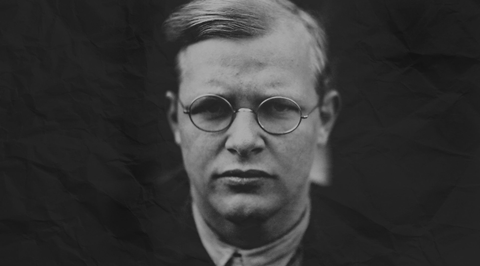80 years after Dietrich Bonhoeffer was executed by the Nazis, the young German theologian’s writings continue to challenge Christians. From resisting toxic nationalism to staying faithful despite Church failings, his life and legacy remain urgently relevant in a world grappling with division, says Krish Kandiah

Just three weeks before VE Day marked the end of the second world war in Europe, a young German theologian who had been imprisoned in Flossenbürg concentration camp by the Nazis was executed. But his voice was not silenced by his death. His letters and writings from prison were smuggled out and published and, now, 80 years on, they continue to offer comfort and challenge to Christians around the world.
Dietrich Bonhoeffer’s life story is fascinating. He travelled widely, wrestled deeply with thorny theological questions, helped rescue Jews from the Nazis, provided intelligence to the Allies, and even played a role in a plot to assassinate Adolf Hitler. His writings range from academic treatises and devotional reflections to deeply personal letters. Throughout them all, he remains steadfast in his commitment to three key elements: his challenge of toxic nationalism, his call to Christian discipleship, and his enduring faith in the Church.
1. Toxic Nationalism must be challenged
Germany was widely regarded as one of the most advanced civilizations in the world at the beginning of the 20th century. It boasted a highly educated population, a rich cultural heritage, and a strong tradition of church attendance. However, after the devastation of the first world war, Germany faced severe economic challenges, most notably hyperinflation, which crippled the economy and left many feeling hopeless.
The National Socialists capitalised on the widespread disillusionment, offering simplistic answers to the complex issues facing the country. They scapegoated the left-wing Bolsheviks and the Jewish minority, blaming them for Germany’s economic decline and the social unrest that followed the war. This propaganda laid the groundwork for the rise of Adolf Hitler and the subsequent horrors of the Nazi regime.
Bonhoeffer saw through this dangerous rhetoric. During his time as a young theological student on a scholarship in New York, he was drawn to the vibrant worship of a black Pentecostal church. There, he witnessed firsthand the racial injustice faced by African Americans under the Jim Crow laws. This experience sensitised him to issues of discrimination, so when he returned to Germany, he immediately recognised the pervasive antisemitism within German society—and the complicity of much of the German church in accepting it. At great personal cost, he called it out, challenging Christians and the wider society to reject and condemn toxic nationalism before it was too late.
With a resurgence in nationalistic sentiment today, we find ourselves confronting similar issues: the scapegoating of immigrants and minorities who are being blamed for everything from housing shortages to long medical waiting lists, and the vilification of the so-called ‘woke’ left. In this context, Bonhoeffer’s courageous call for resistance against dehumanizing rhetoric and oppressive ideologies has a renewed relevance. His message challenges us to actively confront these harmful narratives, to reject xenophobic and anti-immigration media messaging, and to recognise the inherent dignity of all people - regardless of their background, circumstance or identity.
2. Our Discipleship needs to go deeper
The brutal and cruel Nazi ideology was tragically embraced by many in the Church during the 1930s and 1940s. Theologians as renowned as Gerhard Kittel, who wrote one of the most exhaustive and esteemed multi-volume Bible dictionaries, became ardent supporters of the Nazi regime. As much as 80 per cent of the Church succumbed to an ideology that was fundamentally opposed to the Christian teachings of loving God and loving neighbour. They were seduced by Hitler’s racist and xenophobic rhetoric, which led to the deaths of six million Jewish people, plus hundreds of thousands from other marginalized groups. How could so many Christians have got it so wrong?
Bonhoeffer asked this very question. For him, the root of the problem was that the Church was offering a watered down gospel with little emphasis on discipleship. The gospel being presented was one of escapism - it promised salvation without sanctification, forgiveness without followership. It assured an easy life, one that simply went along with the cultural trends of the time. For Bonhoeffer, however, following Christ meant standing apart from the world, even when it was uncomfortable or dangerous. He paid the price for his convictions. He chose to stay in Germany, even when given the opportunity to escape. He chose to stand with the Jewish people, even at great personal risk. He showed courage and compassion, even though it led to imprisonment and death.
We live in a time when the Church often feels fragile, uncertain, and under pressure. The temptation is to water down the Christian message to make it more palatable, to avoid conflict with the prevailing culture, and to seek safety over faithfulness. Bonhoeffer’s life and message are as relevant now as ever. He challenges us to embrace costly discipleship, even in difficult days, standing firm in the truth of the gospel, even when it is unpopular, and refusing to compromise on what it means to follow Christ.
3. Don’t lose faith in God’s Church
We have all had cause to lose confidence in the structures of the Church. Scandals involving child abuse, financial impropriety, bullying, and spiritual manipulation have left many disenchanted, with some seeing their faith deconstructed or destroyed entirely. These failures have deeply wounded not only individuals but also the collective witness of the Church in the world. For many, the Church has become synonymous with hypocrisy and betrayal, rather than compassion and truth.
Bonhoeffer had every reason to give up on the Church. Yet, despite the deep corruption and betrayal he witnessed he never did. Even when the Church turned its back on him, Bonhoeffer remained steadfast. His response was the creation of the Barmen Declaration, which made the modest but radical request of the Church to recognise no authority but God alone. Imagine the impact of a united and sizeable church standing up to the Nazis before they had fully seized power? But from the 20,000 well-attended Protestant churches in Germany at that time, only 2,000 people were willing to sign the declaration. The vast majority either supported the Nazi regime’s influence over the Church or remained silent. The sad truth is that it was likely a Christian who betrayed Bonhoeffer and a Christian who executed him.
Bonhoeffer had encountered the worst of the Church and yet he never stopped believing the best of it. He understood that not every person who called themselves a Christian, or every community that identified as a church, truly embodied what Church is meant to be. In response, he wrote one of the most challenging and profound treatises on the nature of Christian fellowship, in which he outlined the true calling of the Church to be a community of believers, bound together not by convenience or power, but by the radical love and sacrifice of Christ.
Could we follow his example today, recognising and addressing the faults within the church, while also committing ourselves to becoming the church our world so desperately needs? On the 80th anniversary of his death, could we be inspired to have a Bonhoeffer moment, courageously calling our church to resist compromise and complicity with harmful ideologies? Like Bonhoeffer, can we rise up in defence of truth and compassion, advocating for costly discipleship, courageous churches, and deep compassion?





































No comments yet